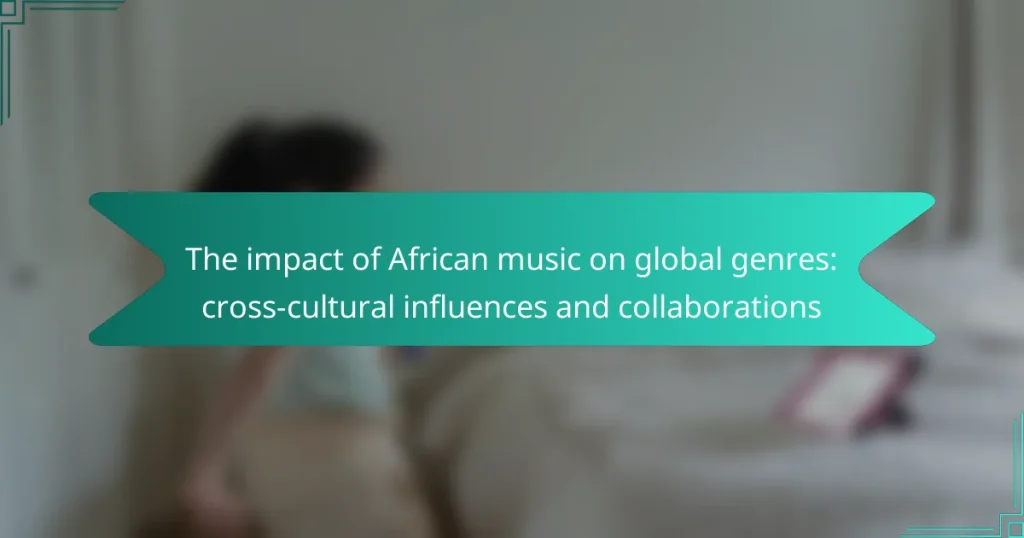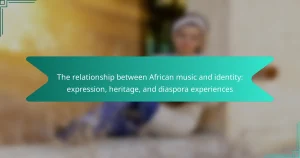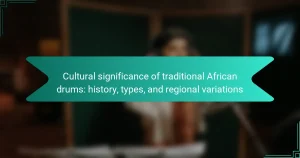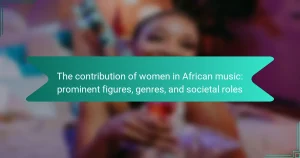African music serves as a foundational influence on numerous global music genres, introducing distinctive rhythms, instruments, and vocal styles. Genres such as jazz, blues, rock, reggae, and hip-hop have roots in African musical traditions, showcasing elements like call-and-response vocals and polyrhythms. Cultural exchanges and collaborations between African artists and international musicians, exemplified by figures like Angelique Kidjo and Burna Boy, further highlight the ongoing impact of African music. The article explores these influences and the fusion of musical styles that enrich the global music landscape, emphasizing the significance of African rhythms in shaping contemporary sounds.
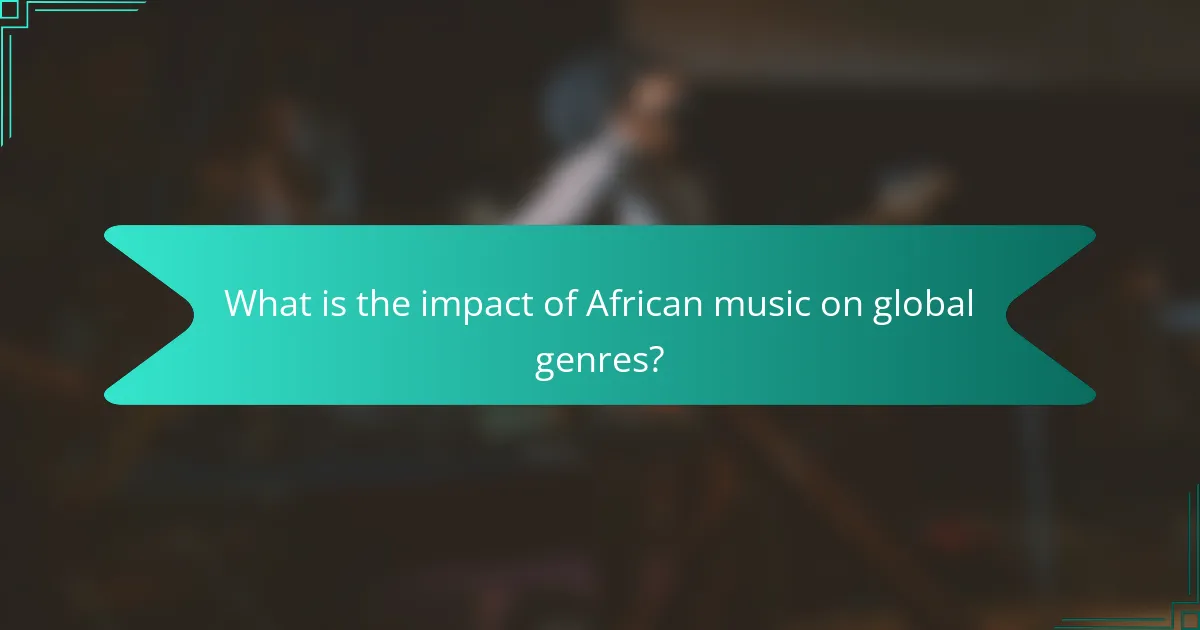
What is the impact of African music on global genres?
African music significantly influences global genres. It introduces unique rhythms, instruments, and vocal styles. Genres like jazz, blues, and rock have roots in African musical traditions. For example, the call-and-response vocal style is prominent in both African music and American blues. The use of polyrhythms in African music has shaped the sound of Latin and Caribbean music. Additionally, contemporary genres like hip-hop incorporate African beats and themes. Collaborations between African artists and global musicians further enhance this impact. Notable examples include the work of artists like Angelique Kidjo and Burna Boy, who blend African sounds with international styles.
How has African music influenced various global music styles?
African music has significantly influenced various global music styles. Its rhythms and instruments have shaped genres like jazz, blues, and rock. For example, the use of polyrhythms in African music has been adopted in jazz compositions. The incorporation of traditional African instruments, such as the djembe and kora, has enriched world music. In the 20th century, artists like Fela Kuti popularized Afrobeat, blending African sounds with funk and jazz. This fusion has inspired musicians globally, leading to collaborations across cultures. The influence of African music is evident in the works of artists like Paul Simon and Beyoncé. Their music incorporates African elements, showcasing its global reach and impact.
What are the key characteristics of African music that contribute to its influence?
African music is characterized by its rich rhythmic complexity, diverse instrumentation, and strong communal elements. The use of polyrhythms is a defining feature, allowing multiple rhythms to coexist. This complexity engages listeners and encourages participation. African music often incorporates traditional instruments such as the djembe, kora, and mbira. These instruments contribute unique sounds that enhance musical texture. Additionally, call-and-response patterns are prevalent, fostering interaction between performers and audiences. This communal aspect strengthens cultural ties and enhances the music’s impact. Furthermore, African music frequently addresses social and political themes, resonating with audiences worldwide. Historical influences, such as the transatlantic slave trade, have also shaped its evolution and global reach.
How do traditional African rhythms and instruments shape global genres?
Traditional African rhythms and instruments significantly shape global music genres. These rhythms introduce polyrhythmic structures that enhance musical complexity. Instruments like the djembe, kora, and mbira provide unique timbres and playing techniques. This influence is evident in genres such as jazz, reggae, and hip-hop. For example, jazz musicians often incorporate African rhythmic patterns into their improvisations. Reggae music frequently utilizes off-beat rhythms derived from African traditions. Hip-hop producers sample traditional African music to create innovative beats. The global music landscape reflects this deep-rooted connection to African musical heritage.
Why are cross-cultural collaborations important in music?
Cross-cultural collaborations are important in music because they foster innovation and creativity. These collaborations blend diverse musical styles and traditions. This results in unique sounds that can reach broader audiences. For example, African rhythms have influenced genres like jazz and hip-hop. Collaborations also promote cultural exchange and understanding. They allow artists to share their heritage and stories. Additionally, such partnerships can lead to increased visibility and opportunities for underrepresented musicians. The global music landscape benefits from these diverse influences, making it richer and more dynamic.
How do collaborations enhance the authenticity of African music in global contexts?
Collaborations enhance the authenticity of African music in global contexts by integrating diverse cultural elements. These partnerships allow African artists to showcase traditional sounds alongside global genres. Collaborations often involve artists from different backgrounds, enriching the musical experience. For instance, artists like Burna Boy and Beyoncé have blended Afrobeat with pop, creating authentic cross-genre music. This fusion maintains African musical roots while appealing to broader audiences. Furthermore, collaborations can introduce African music to new markets, increasing its visibility. They also foster cultural exchange, promoting understanding and appreciation of African heritage. Overall, collaborations serve as a bridge between African music and global audiences, reinforcing its authenticity.
What are some notable examples of successful cross-cultural music collaborations?
Notable examples of successful cross-cultural music collaborations include “Despacito” by Luis Fonsi featuring Daddy Yankee and Justin Bieber. This song blends Latin pop with reggaeton and gained worldwide acclaim, topping charts in multiple countries. Another example is “Waka Waka (This Time for Africa)” by Shakira featuring the South African band Freshlyground. This song combined pop and African musical elements, becoming an anthem for the 2010 FIFA World Cup. “Redemption Song” by Bob Marley has also seen various collaborations, including a notable version with the African artist Angelique Kidjo. This collaboration highlighted reggae’s influence across cultures. Additionally, the project “Africa Express” brings together Western and African artists, showcasing diverse musical styles through live performances and recordings. These collaborations illustrate the blending of different cultural influences, enhancing the global music landscape.
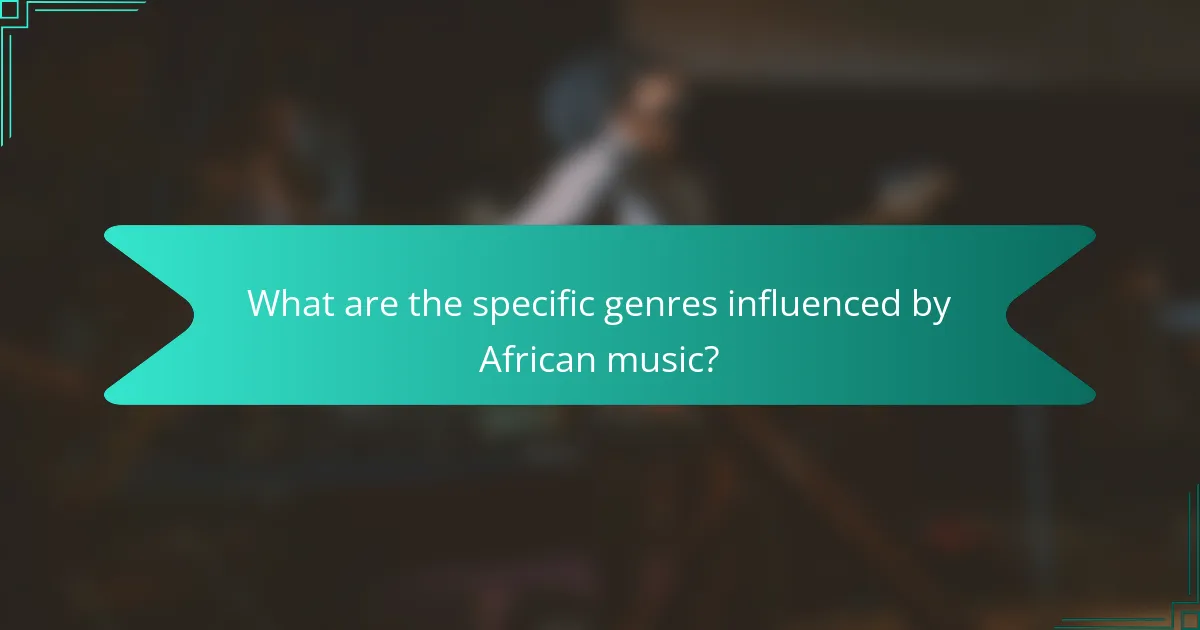
What are the specific genres influenced by African music?
African music has influenced numerous genres globally. These include jazz, which incorporates African rhythms and improvisation techniques. Blues emerged from African musical traditions, reflecting themes of struggle and resilience. Rock music also draws from African rhythms, particularly in its percussive elements. Reggae is heavily influenced by African musical styles, emphasizing rhythm and social themes. Hip-hop incorporates African beats and storytelling traditions, showcasing cultural narratives. Salsa music blends African rhythms with Caribbean influences, creating vibrant dance music. Additionally, electronic dance music often samples African music, highlighting its rhythmic complexity. These genres demonstrate the extensive impact of African music on global music landscapes.
Which global genres have been most significantly shaped by African music?
African music has significantly shaped genres such as jazz, blues, rock, and hip-hop. Jazz emerged in the early 20th century, incorporating African rhythms and call-and-response patterns. Blues, rooted in African American experiences, draws from African musical traditions. Rock music evolved by integrating African rhythms and instrumentation, influencing its sound. Hip-hop, originating in the 1970s, incorporates African beats and sampling techniques. These genres showcase the profound influence of African music on global musical landscapes.
How has African music contributed to the development of jazz?
African music has significantly contributed to the development of jazz through its rhythmic complexity and improvisational elements. The use of polyrhythms in African music influenced jazz musicians to explore intricate rhythmic patterns. Call-and-response techniques from African traditions became integral to jazz performance. Additionally, the emphasis on improvisation in African music parallels the spontaneous nature of jazz. Instruments like the banjo and drums in jazz have African origins, highlighting this cultural connection. The Great Migration brought African American musicians to urban centers, facilitating the fusion of African musical elements with European styles. This blend gave rise to jazz as a distinct genre in the early 20th century. The legacy of African music continues to shape jazz today, evident in its diverse subgenres and global reach.
In what ways has hip-hop incorporated elements of African music?
Hip-hop has incorporated elements of African music through rhythm, instrumentation, and vocal techniques. African drumming patterns significantly influence hip-hop beats. Many hip-hop tracks utilize polyrhythms, which are prevalent in African music traditions. Artists often sample traditional African instruments like the djembe and kora in their productions. Additionally, call-and-response vocal styles are common in both hip-hop and African music. This technique enhances audience engagement during performances. Furthermore, hip-hop lyrics sometimes reflect African storytelling traditions, emphasizing cultural narratives. Collaborations between hip-hop artists and African musicians further blend these musical styles. Notable examples include the work of artists like Akon and Wale, who draw from their African heritage.
What role do African artists play in global music scenes?
African artists play a significant role in global music scenes by introducing diverse rhythms and styles. They contribute unique musical elements that enrich various genres such as hip-hop, pop, and electronic music. Collaborations between African musicians and international artists often result in innovative soundscapes. For example, the collaboration between Nigerian artist Burna Boy and American artist Beyoncé highlights this fusion. African artists also influence global music trends through platforms like Afrobeats and Highlife. The global success of artists like Wizkid and Tiwa Savage demonstrates their impact on mainstream music. Furthermore, African music festivals attract international audiences, showcasing the continent’s talent. This cultural exchange fosters greater appreciation for African music worldwide.
How do African artists maintain their cultural identity while collaborating internationally?
African artists maintain their cultural identity while collaborating internationally by integrating traditional elements into their work. They often incorporate indigenous instruments, rhythms, and languages into their music. This fusion allows them to express their heritage while appealing to a global audience. Many artists participate in cultural exchanges that emphasize their roots. They also collaborate with international artists who respect and celebrate their cultural backgrounds. Festivals and platforms that showcase African music often prioritize authentic representation. Research shows that artists who blend genres while honoring their origins create unique sounds that resonate worldwide. This approach not only preserves their identity but also enriches global music.
What challenges do African artists face in the global music industry?
African artists face significant challenges in the global music industry. Limited access to distribution channels restricts their reach. Many struggle with inadequate funding for production and marketing. Language barriers can hinder international collaboration and appeal. Cultural misconceptions often lead to misrepresentation in the global market. Additionally, copyright issues can undermine their rights and earnings. The dominance of Western music can overshadow African genres. Finally, inadequate infrastructure in their home countries complicates their ability to compete globally. These factors collectively impede the growth and recognition of African artists in the international arena.

How do cultural exchanges affect the evolution of music?
Cultural exchanges significantly influence the evolution of music. They facilitate the sharing of diverse musical styles, instruments, and traditions. This interaction leads to the fusion of genres, creating new sounds and forms. For example, African rhythms have merged with jazz and blues, shaping modern music. Historical events, such as the transatlantic slave trade, spread African musical elements to the Americas. Collaborations between artists from different cultures also drive innovation. The global popularity of Afrobeat illustrates this impact. It blends traditional African music with jazz, funk, and other genres. Cultural exchanges enrich the music landscape, promoting diversity and creativity.
What are the mechanisms of cultural exchange in music?
Cultural exchange in music occurs through various mechanisms. These include migration, trade, and technology. Migration introduces new musical styles and instruments to different regions. For example, the transatlantic slave trade brought African rhythms to the Americas. Trade routes facilitated the sharing of musical traditions between cultures. The Silk Road, for instance, allowed for the exchange of instruments and musical ideas.
Technology also plays a crucial role in cultural exchange. The advent of recording technology in the 20th century enabled global dissemination of music. This allowed artists from diverse backgrounds to collaborate and blend genres. Streaming platforms further amplify this exchange by providing access to a wide array of musical influences.
Live performances and festivals serve as another mechanism. They bring together artists from different cultures, fostering collaboration and innovation. For example, the annual WOMAD festival showcases global music, promoting cross-cultural understanding.
In summary, mechanisms of cultural exchange in music include migration, trade, technology, and live performances. Each contributes to the blending and evolution of musical styles across cultures.
How do technology and social media facilitate these exchanges?
Technology and social media facilitate exchanges in African music by enabling instant communication and collaboration. These platforms allow artists to share their work globally. Social media channels like Instagram and TikTok promote viral music trends. Streaming services provide access to diverse music from Africa. This accessibility fosters cross-cultural collaborations. For instance, African artists can easily connect with global musicians. Technology also allows for the sharing of cultural stories and heritage. This exchange enriches global music genres and promotes understanding.
What impact do music festivals have on cross-cultural musical interactions?
Music festivals significantly enhance cross-cultural musical interactions. They provide a platform for diverse musical styles and traditions to converge. Artists from various backgrounds perform together, fostering collaboration. Audiences experience a blend of cultural expressions, promoting understanding and appreciation. For instance, festivals like WOMAD showcase global artists, highlighting cultural diversity. Research indicates that such events contribute to cultural exchange and innovation in music. Festivals serve as a catalyst for new genres and fusion styles. They create opportunities for networking among musicians across cultures. Overall, music festivals play a crucial role in enriching global musical landscapes.
What are the future trends in African music’s influence on global genres?
African music is increasingly influencing global genres through collaborations and fusion styles. This trend is evident in the rise of Afrobeat and its integration into pop, hip-hop, and electronic music. Artists like Burna Boy and Wizkid have gained international recognition, showcasing African rhythms and melodies. The global music industry is embracing these sounds, leading to more cross-cultural collaborations. Streaming platforms amplify this trend by providing access to diverse music. Additionally, the incorporation of African instruments and vocal styles into mainstream music is becoming more common. This influence is expected to grow, as artists seek authenticity and cultural richness in their work. Major music festivals are featuring African artists, further bridging cultural gaps.
How might emerging technologies shape the future of African music collaborations?
Emerging technologies will significantly shape the future of African music collaborations. These technologies enhance connectivity among artists across the continent and globally. Digital platforms enable real-time collaboration, allowing musicians to work together despite geographical barriers. For instance, software like Soundtrap and BandLab facilitates remote music production and sharing.
Moreover, social media platforms amplify exposure for African artists, connecting them with international audiences. Streaming services like Spotify and Apple Music provide access to a wider market. Data analytics tools help artists understand audience preferences and trends.
Additionally, advancements in virtual reality and augmented reality offer immersive experiences for fans. These technologies create innovative ways to engage audiences during live performances. Blockchain technology can ensure fair compensation and rights management for artists.
Overall, these emerging technologies foster collaboration and creativity, transforming the landscape of African music.
What role will African music play in the global music landscape in the next decade?
African music will play a significant role in shaping the global music landscape over the next decade. Its diverse rhythms and cultural expressions will influence various genres worldwide. Collaborations between African artists and international musicians will become more common. This will lead to the fusion of traditional African sounds with pop, hip-hop, and electronic music. The rise of platforms like Afrobeats highlights this trend. For instance, artists like Burna Boy and Wizkid have gained global recognition. Their music has topped charts in multiple countries. Additionally, African music festivals are attracting international audiences. This growing interest indicates a shift in global music consumption. Overall, African music will enhance cultural exchange and innovation in the global music scene.
What practical tips can artists use to create successful cross-cultural music collaborations?
Artists can create successful cross-cultural music collaborations by prioritizing open communication. Clear dialogue helps in understanding cultural nuances. Artists should research each other’s musical backgrounds and traditions. This knowledge fosters respect and appreciation. Collaborators must establish shared goals for the project. Defining objectives aligns creative visions. Utilizing technology for remote collaboration can bridge geographical gaps. Platforms like Zoom and cloud storage facilitate real-time sharing. Engaging local musicians enhances authenticity in the collaboration. Their insights can enrich the creative process. Lastly, being adaptable and open to new ideas is crucial. Flexibility allows for a more organic fusion of styles.
The main entity of this article is African music and its impact on global music genres through cross-cultural influences and collaborations. The article explores how African music has shaped various genres, including jazz, blues, rock, and hip-hop, by introducing unique rhythms, instruments, and vocal styles. It highlights the significance of traditional African elements in contemporary music and the role of collaborations between African artists and global musicians in fostering cultural exchange. Additionally, the article addresses the challenges faced by African artists in the global music industry and discusses future trends in the evolution of African music’s influence worldwide.
